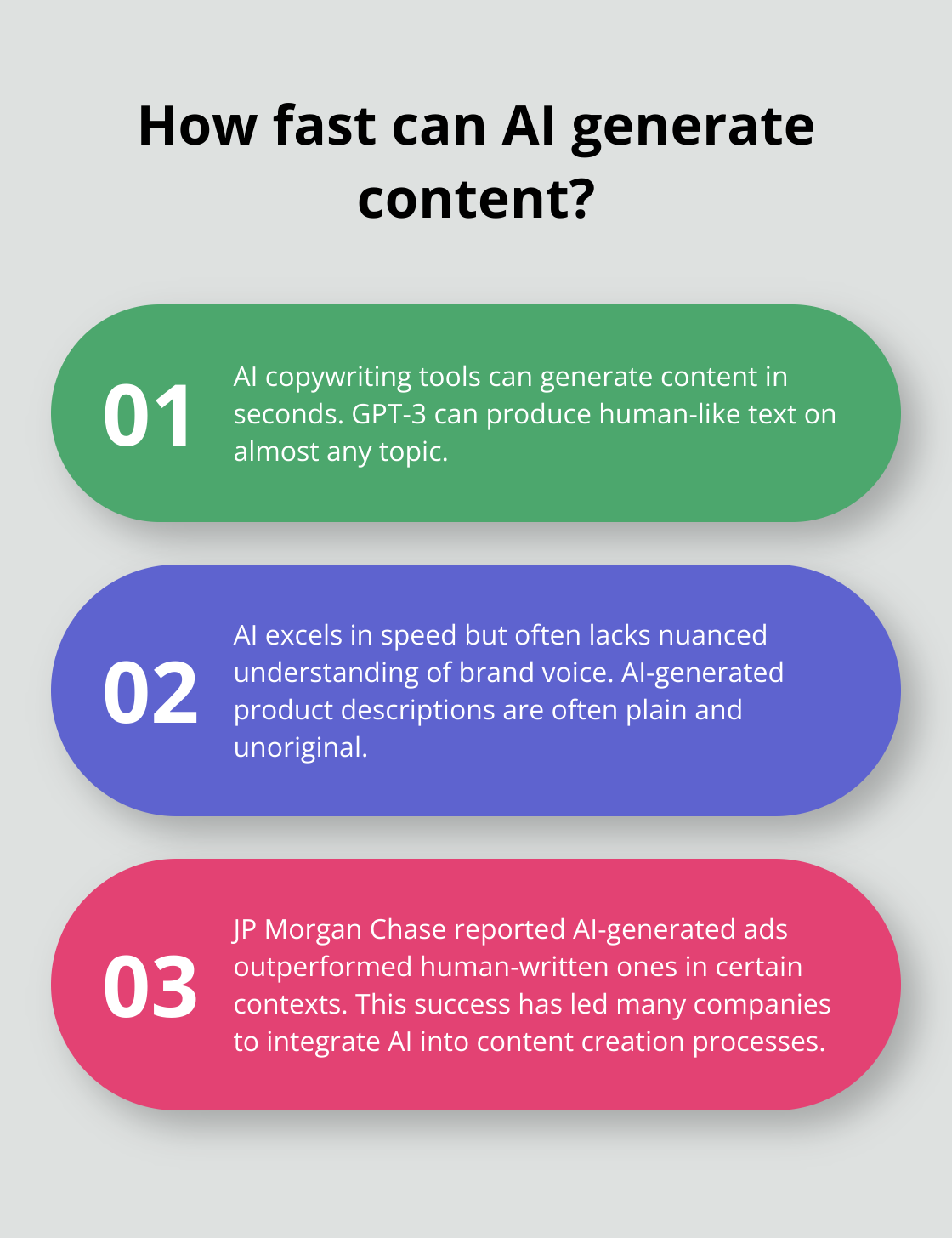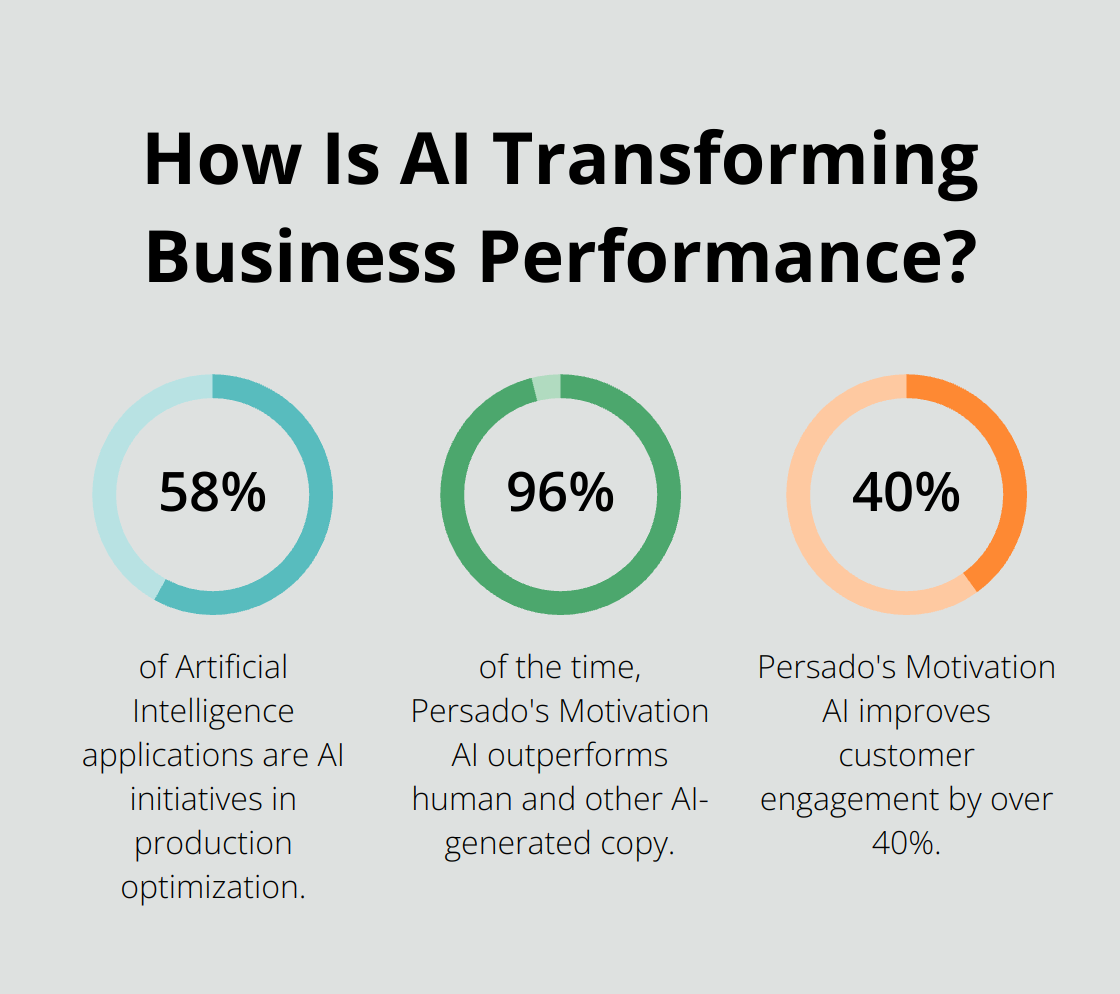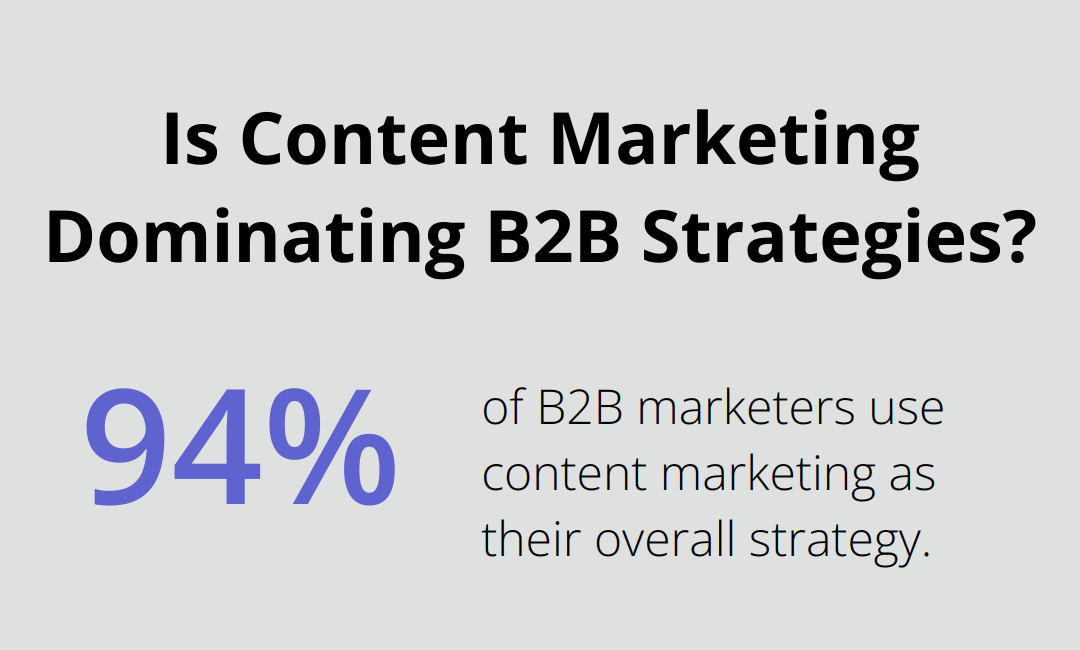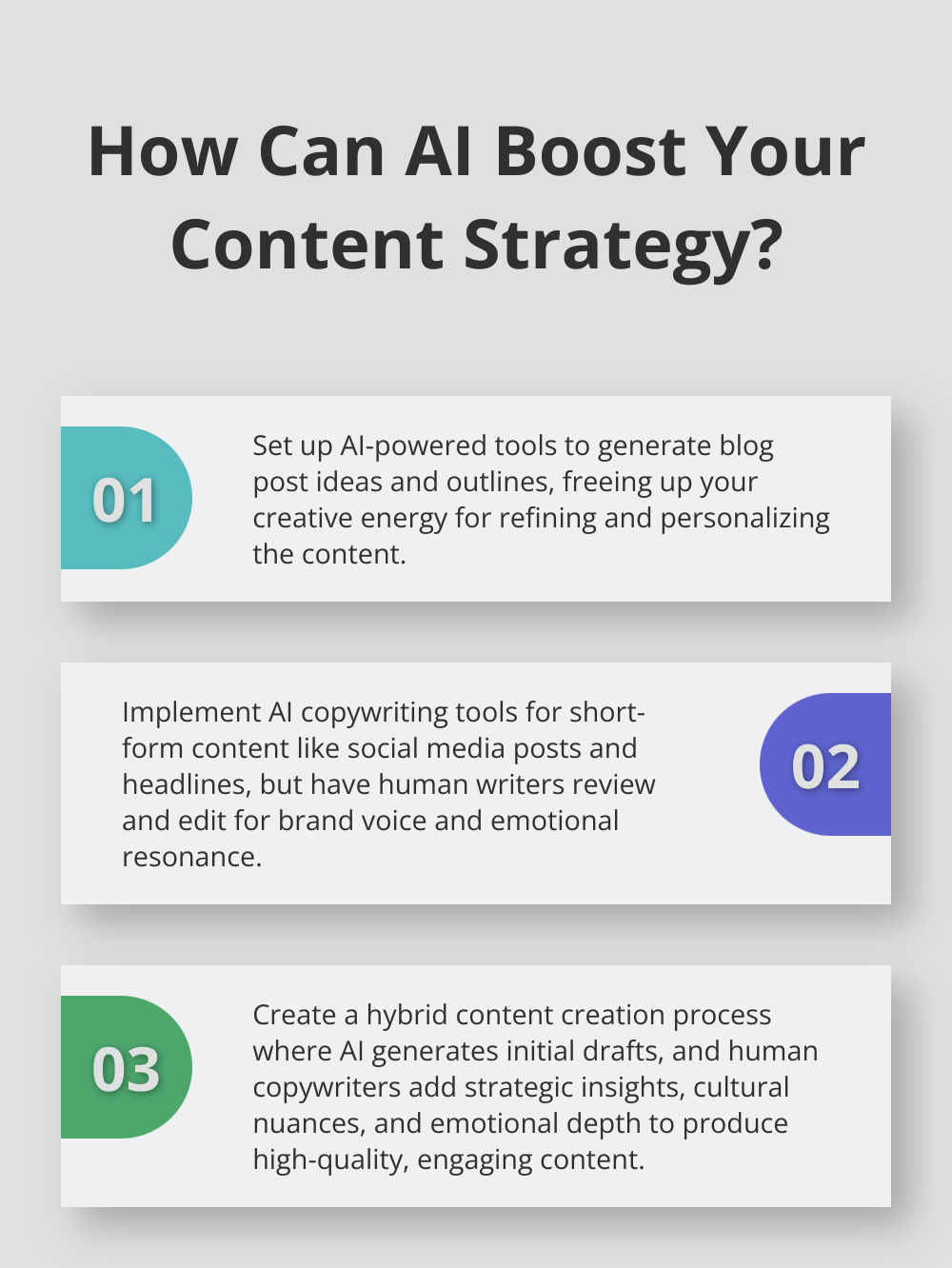At My Rich Brand, we’re constantly exploring the intersection of technology and creativity. The question on everyone’s mind: Is copywriting going to be replaced by AI?
This blog post dives into the current state of AI in copywriting, its advantages, and the irreplaceable human element. We’ll also explore how businesses can leverage AI while maintaining human expertise in their marketing efforts.
AI Copywriting Today: Revolutionizing Content Creation
The Rise of AI-Powered Tools
The copywriting landscape has undergone a dramatic transformation with the introduction of AI-powered tools. These technologies have redefined content creation, offering unprecedented speed and efficiency. AI copywriting tools can now generate blog posts, social media captions, and even long-form content in mere seconds. GPT-3, one of the most advanced language models, exemplifies this capability by producing human-like text on almost any topic.
Capabilities and Limitations
AI doesn’t create content from scratch. These tools rely on vast datasets of existing content to generate new text. This approach makes them excellent at replicating styles and formats but often results in a struggle with truly original ideas or cutting-edge concepts not yet widely documented.

While AI excels in speed, it often lacks the nuanced understanding of brand voice and audience that human copywriters bring to the table. AI-generated product descriptions were often plain and unoriginal, lacking the persuasive edge that drives conversions.
The Emotional Intelligence Gap
AI faces a significant hurdle in emotional intelligence. It cannot truly understand or convey complex human emotions, which are often at the heart of compelling copy. This limitation becomes particularly evident in storytelling and brand narrative, where emotional resonance is key.
Real-World Applications and Results
Despite its limitations, AI has made significant inroads in the marketing world. JP Morgan Chase reported that AI-generated ads outperformed human-written ones in certain contexts, particularly for short-form copy like social media posts and headlines. This success has prompted many companies to integrate AI into their content creation processes.
It’s important to note that most successful applications of AI in copywriting involve human oversight and editing. The best results stem from a collaboration between AI and human creativity, not from AI alone.
The Future of AI in Copywriting
As AI technology continues to evolve, we can expect more sophisticated tools that address current limitations. However, the core strengths of human copywriters – creativity, emotional intelligence, and strategic thinking – remain irreplaceable.
Companies like My Rich Brand have found that combining AI efficiency with human expertise yields the best results. Their AI-enhanced copywriting services (which leverage the speed of AI while ensuring alignment with brand voice and marketing goals) represent the future of content creation in the digital age.
The next chapter will explore the specific advantages that AI brings to the copywriting process, shedding light on why businesses are increasingly turning to this technology to enhance their content strategies.
AI Copywriting Advantages: Revolutionizing Content Creation
Turbocharging Content Production
AI copywriting tools have revolutionized content output. Tasks that once consumed days now wrap up in hours. A study revealed that AI initiatives in production optimization account for 58% of Artificial Intelligence applications. This speed boost allows businesses to maintain a robust online presence across multiple platforms without exhausting their marketing teams.
Banishing Writer’s Block
AI excels at idea generation and outline creation. Modern AI tools can produce dozens of blog post ideas in seconds, providing human writers with a launchpad for creativity. This feature proves invaluable for businesses that must maintain a regular content calendar but occasionally hit creative roadblocks.
Data-Driven Precision
AI copywriting transcends mere speed; it offers unparalleled precision. These tools analyze vast data sets to optimize content for specific audiences. Persado’s Motivation AI outperforms human and other AI-generated copy 96% of the time, improving customer engagement by over 40%.
Consistency in Brand Voice
AI tools excel at maintaining a consistent brand voice across various content pieces. They can learn and replicate specific tones, styles, and vocabularies (ensuring that all content aligns with a brand’s established identity). This consistency proves especially valuable for large organizations with multiple content creators.
Cost-Effective Content Creation
The implementation of AI in copywriting can lead to significant cost savings. By automating certain aspects of content creation, businesses can reduce the time and resources required for content production. This efficiency allows companies to allocate their budgets more strategically, focusing human creativity on high-value tasks that require nuanced understanding and emotional intelligence.

While AI offers impressive advantages, it’s important to view it as a powerful tool rather than a replacement for human creativity. The most effective content strategies combine machine efficiency with human insight. This synergy ensures that businesses benefit from AI’s strengths while preserving the unique voice and emotional connection that only human writers can provide.
As we explore the irreplaceable human element in copywriting, we’ll uncover why the future of content creation lies in the harmonious collaboration between AI and human expertise.
Can AI Match Human Creativity in Copywriting?
The Emotional Intelligence Gap
AI has transformed the copywriting landscape, significantly reducing the time and effort required for content creation. However, it cannot replicate the human element. Human copywriters draw from personal experiences, cultural understanding, and empathy to craft messages that resonate on a deeper level. This emotional connection turns casual readers into loyal customers.

A study found that 94% of B2B marketers use content marketing as their overall strategy. These goals require a nuanced understanding of human emotions that AI currently can’t match.
Mastering Context and Nuance
Human copywriters excel at understanding context and nuance (essential elements in effective marketing). They pick up on subtle cultural references, current events, and societal trends to create timely and relevant content. This ability to read between the lines and adapt messaging accordingly is something AI struggles with.
For example, during the COVID-19 pandemic, many brands had to quickly pivot their messaging to show empathy and support. Human copywriters navigated this sensitive situation with tact and understanding, a task that would have challenged AI without extensive reprogramming.
Strategic Thinking and Brand Storytelling
The most significant advantage human copywriters have is their ability to think strategically and craft compelling brand narratives. While AI can generate content based on data and patterns, it can’t develop a comprehensive marketing strategy or create a unique brand voice from scratch.
Many companies (including My Rich Brand) combine AI efficiency with human expertise to create marketing strategies that drive real results. Teams of copywriters work alongside AI tools to develop content that not only ranks well but also tells a brand’s unique story in a way that connects with the audience.
The Future of Copywriting
The future of copywriting doesn’t involve choosing between AI and humans-it focuses on leveraging the strengths of both. As we continue to navigate this evolving landscape, the most successful brands will find the right balance between AI-powered efficiency and human creativity. While AI has transformed professional copywriting, it cannot fully replace human creativity.
Final Thoughts
The future of copywriting combines AI efficiency with human creativity. AI transforms the landscape with speed and data-driven insights, but human emotional intelligence and strategic thinking remain essential. Successful businesses will leverage AI’s strengths while maintaining the human touch that resonates with audiences.

Copywriters should view AI as a tool to enhance their capabilities rather than a threat. The future copywriter will use AI for research and initial drafts, while focusing on refining messages and developing content strategies. Businesses should invest in both AI technologies and human talent to create content that is efficient, data-driven, and emotionally resonant.
At My Rich Brand, we offer AI-enhanced copywriting services that blend technology with creativity. Our service plans cater to businesses at various growth stages, providing a mix of AI efficiency and human expertise. The question “Is copywriting going to be replaced by AI?” has a complex answer, but the future of copywriting remains bright for those who adapt and grow with technology.





